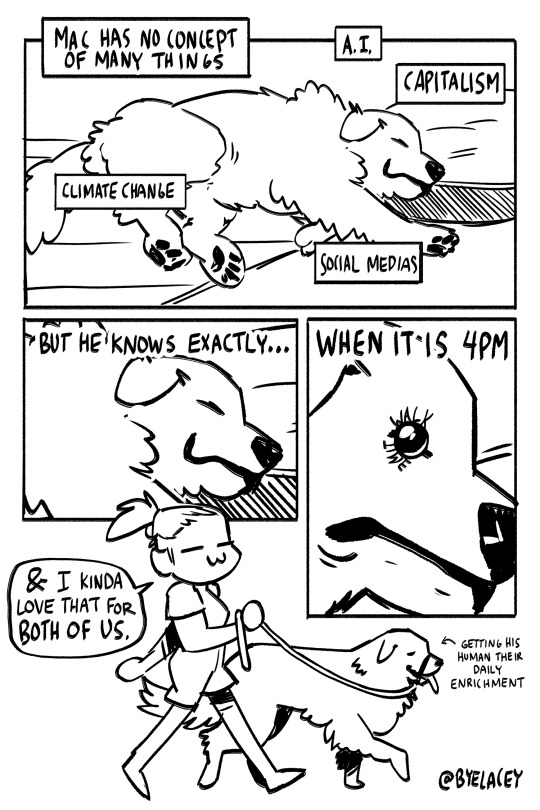natelm2nd
15K posts
Nate, he/him, guide dog Neptune DFTBA! Current interests include; Critical Role, natural history, fantasy/sci-fi video games, learning to be a better home cook.
Don't wanna be here? Send us removal request.
Text
one of those "the last video game's characters have to rescue you" posts but I luck out because its Geralt and Ciri.
1 note
·
View note
Text
and to be clear NaNoWriMo closing is genuinely really sad. I've just already done my grieving for it. I wish it hadn't happened this way, but NaNo's fall was determined as soon as Kilby took over.
A lot of MLs did take off and make their own groups though. If any participants are reading this who want to continue NaNo participation, check out the reddit!! Lots of people did it from there and many former volunteers for the org are there and if you ask "is anyone from my region still doing nano" I bet you'll get some replies, or find someone doing it in discord.
Keep writing! NaNoWriMo was us, it wasn't HQ.
355 notes
·
View notes
Text
the tumblr layout is different again, but also not the worst I guess?
0 notes
Note
Would you consider yourself to be Young Elvis, Medium Elvis, or Older Elvis?
Woah mama I'm 90 years old
#wow.#really committing to the bit.#Elvis would certainly have found the internet Interesting I'm sure#hopefully he'd be Normal and not turn into someone like RFK Jr. or whatever#probably would get “cancelled” for something though.
80 notes
·
View notes
Text
my mom is playin fuckn animal crossing in real life
she got this painting for $75 in an old case at an antique market shes been going to for years, and she thought it looks really beautiful, so she sent an email to a local art center to have it appraised

and now she has an art conservator in her emails making a plan to have her come bring it in to be appraised as a genuine Hokusai wood block print from over a hundred of years ago
thats so fucked up to me. my mom went fuckin shopping at Crazy Redd's
22K notes
·
View notes
Text

thinking about my dog and how he makes sure i get my daily mental health outings
85K notes
·
View notes
Text
can we reintroduce “disturbing” back into the popular lexicon in place of most uses of “traumatizing”
13K notes
·
View notes
Text
find it crazy that people expect a public statement from everybody on every issue or they risk being cancelled. it’s happening at a macro level and at a micro level within fandom, and it makes spaces unenjoyable tbh.
463 notes
·
View notes
Note
did. did Elvis just call Caesar's Legion twinks?
twink or bear
Woah mama I don't support the Legion or NCR
2K notes
·
View notes
Text
Make Video Games More Accessible By...
Dear game developers:
Make your games more accessible by
Allowing Button remapping
Supporting multiple kinds of controllers
Supporting multiple types of inputs for when solving puzzles or clues
Match the color and or pattern puzzle
Follow the sound and controller vibration to find the mcguffin
Allow for zooming in and out if you’re doing any kind of “pattern alignment” puzzle.
Subtitles on everything, for fuck’s sake
If your motion/camera thing’s instructions start with “stand up and….”, rethink your design.
Allow for adjusting the field of view
Aim assist.
If someone is struggling with a puzzle or task, start offering tool tips and hints on screen
Remember that the goal is not to have the player play the game like you would. The goal is for the gamer to have fun and experience the game and art you’ve spent so much time and energy to create in a way that brings them joy.
Removing and avoiding harmful tropes around disability - physical or otherwise.
6K notes
·
View notes
Text
Keep seeing Tiktoks that are like lol autistics are always washing their hands when cooking when they get stuff on their hands and I refuse to believe that's exclusively an autism thing. If you're not washing your hands constantly your kitchen would get sooooo dirty cause you're touching all of your spices and sauces and shit you don't want the containers to get nasty!!!
18 notes
·
View notes
Text
love to see Belphie's mind work. he doesn't like Grim's diabetes-friendly food, so when I laid some out, he sniffed it, broke into a gallop, did several circuits of the living room parkouring off the walls, stopped, sniffed it again, and ate some.
1K notes
·
View notes
Text
Reblog to let your followers know that they’re safe from jumpscares/screamers/etc from you on April 1st but they are NOT safe from getting boop’d like an idiot amen
105K notes
·
View notes
Text
can we reintroduce “disturbing” back into the popular lexicon in place of most uses of “traumatizing”
13K notes
·
View notes
Text
why is “get ___ed idiot” one of the funniest sentences in the english language
175K notes
·
View notes